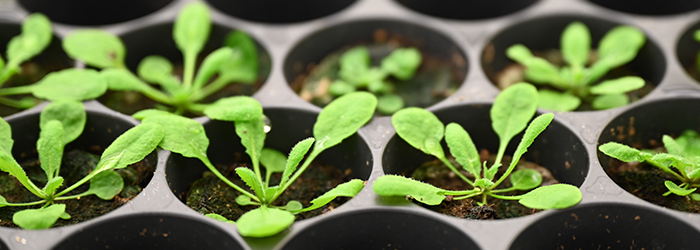CPL3 protein regulates DELLA
New insights into the GA pathway
Ghent 13/05/2024 - Gibberellic acid (GA) plays a central role in many plant developmental processes and is crucial for crop improvement. DELLA proteins function as essential core suppressors in the GA pathway. However, little is known about the regulation of these DELLA proteins. A team of researchers from the VIB-UGent Center for Plant Systems Biology and the Sichuan Agricultural University (China) has now identified CPL3 as a vital regulator of DELLA. Their findings were published in New Phytologist.
Gibberellic acid (GA) is a plant hormone that plays a central role in many development processes, such as stem elongation, leaf expansion, and vegetative growth. The GA signaling pathway is suppressed by DELLA proteins, universal growth regulators, active in various plant development processes like shoot growth, flowering initiation, and seed germination.
Because of the importance of DELLA proteins in plant growth and development, researchers have tried to elucidate how their stability and activity are controlled. Earlier research showed that the phosphorylation of DELLA can affect their stability and function, but little is known about this phosphorylation process and how it is modulated.
DELLA proteins were targeted to generate high-yielding varieties during the Green Revolution, and their function is well conserved among vascular plants. Therefore, understanding more precisely how they are regulated is a first step towards further improving beneficial crop traits through DELLA engineering. - Marieke Dubois, Postdoc at VIB-UGent Center for Plant systems Biology
Researchers of the VIB-UGent Center for Plant Systems Biology and Sichuan Agricultural University (China) have now elucidated a part of the DELLA phosphorylation puzzle. They present C-TERMINAL DOMAIN PHOSPHATASE-LIKE 3 (CPL3) as a candidate phosphatase physically interacting with DELLA proteins in Arabidopsis. By using cpl3 mutants, they could display plants with longer hypocotyls and earlier flowering. These are phenotypes that resemble GA-activated plants. cpl3 mutants also showed less responses to GA treatments, indicating that CPL3 plays a role in GA-responsive processes. Combined, the results of this study identify CPL3 as a new phosphatase that interacts with DELLA to regulate its function.

Our previous study highlighted a role for CPL3 in RNA metabolism. These new results thus suggest very diverse roles for CPL3 in the regulation of RNA stability, DELLA activity, plant growth and immunity –Ting Li, researcher at the Sichuan Agricultural University, Chengdu, China.
This study was done with the help of FWO and Methusalem funding and the National Natural Science Foundation of China.
Publication: https://doi.org/10.1111/nph.19742
About the VIB-UGent Center for Plant Systems Biology
The VIB-UGent Center for Plant Systems Biology wants to gain insight into how plants grow and respond to the environment. Scientists study how leaves and roots are formed, which micro-organisms live on and around the plant and which substances the plant makes. They map out the genetic diversity of the plant kingdom. This knowledge can lead to sustainable innovations in agriculture and food.
About VIB
VIB’s core mission is to generate disruptive insights in the molecular underpinning of life and to translate these actively into impactful innovations for patients and society. VIB is an independent research institute where some 1,800 top scientists from Belgium and abroad conduct pioneering basic research. As such, they are pushing the boundaries of what we know about molecular mechanisms and how they rule living organisms such as human beings, animals, plants, and microorganisms. Based on a close partnership with five Flemish universities – Ghent University, KU Leuven, University of Antwerp, Vrije Universiteit Brussel, and Hasselt University – and supported by a solid funding program, VIB unites the expertise of all its collaborators and research groups in a single institute. VIB’s technology transfer activities translate research results into concrete benefits for society such as new diagnostics and therapies and agricultural innovations. These applications are often developed by young start-ups from VIB or through collaborations with other companies. This also leads to additional employment and bridges the gap between scientific research and entrepreneurship. VIB also engages actively in the public debate on biotechnology by developing and disseminating a wide range of science-based information.
More info can be found on www.vib.be.
.png)


